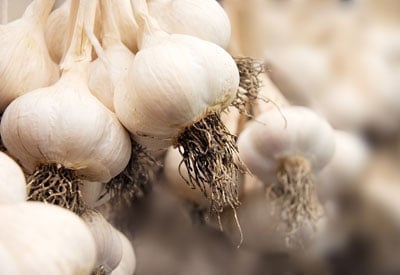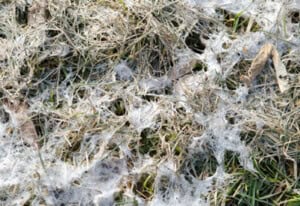There are many reasons that garlic (Allium sativum), a prominent member of the onion family, has been cultivated for thousands of years. Today’s gardeners know that growing garlic bulbs is ridiculously easy, takes up little room and provides an essential flavor for many dishes.
Garlic is valued for its zesty kick and many health-boosting benefits. Research has shown that it can reduce the risk of heart disease by lowering LDL cholesterol levels and high blood pressure. Many Italian grandmothers have relied on it for generations to knock back colds, too.
Fun Fact: Hippocrates (born c. 460 BC), regarded as the father of Western medicine, used this popular vegetable for treating poor digestion, shortness of breath, parasites and lethargy.
Quick Guide: Planting, Growing & Harvesting Garlic
- Choose large, blemish-free bulbs
- Plant in sandy, compost-rich soil in full sun
- Mulch heavily; water and fertilize regularly
- For best harvest, plant in fall and harvest the following summer
- Very few pests aside from onion maggot larva

BUILD YOUR SOIL
Soil Amendments
Planet Natural offers the organic amendments that your plants need to thrive.
View allSite Preparation
Each spring, work plenty of organic compost or well-rotted animal manure deeply into your planting area. Garlic thrives in all zones and grows very well in raised beds, except in very dry areas. It requires full sun and sandy, fast-draining soil full of organic matter. Regular watering during the gardening season is recommended for optimal bulb development.
How to Plant
The best time to plant is mid-autumn (see Fall is Garlic Planting Time). When planting, break the bulbs apart into individual cloves and, with the papery husks on, poke the cloves into the ground with the pointed end up (root end down) 1 inch deep in rows 1 foot apart. Top the soil with 4 to 6 inches of mulch to help maintain soil moisture and limit weeds. Fertilize by spraying leaves every two weeks with fish and kelp fertilizer or side dress with a good organic bulb food.
Mulching fall garlic is important. Five inches or more is not too much. The mulch may not prevent some ground freezing but it will help prevent frost heaves that will displace your carefully placed bulbs.
Tip: If you want to produce large bulbs, plant only large cloves.

Harvesting and Storage
Harvest garlic using a spading fork when the leafy tops fall over, usually in June or July, depending on your location. Air-dry the bulbs by tying plants together in bundles of 6 to 10 and hanging them to cure for about four to six weeks. When completely dry, remove the tops and the roots and store in a cool dry area. Spring-planted cloves requires 120-150 days to reach maturity. However, the best quality and yields are from fall-planted cloves.
Looking for a tasty treat? Every gourmand worth her designer sea salt is using garlic scapes to flavor dishes ahead of the harvest.
Insect & Disease Problems
Very few pests bother with garlic, but occasionally, the onion maggot larva can be seen in cloves at harvest time. The typical symptom is premature dying of the leaf tips.
Seed Saving Instructions
After curing, bulbs may be stored in paper bags or hung in braids or in bunches. Bulbs that are to be used for planting stock will keep for 6 to 8 months when stored in the dark at 35-40˚F and 60% humidity.











